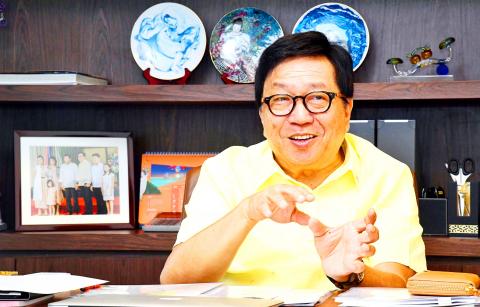The Cabinet’s New Southbound Policy is bearing fruit in the Philippines, as Taipei and Manila are cooperating more closely on agriculture, trade and investment, and education and healthcare, Manila Economic and Cultural Office (MECO) Chairman and Resident Representative Angelito Banayo said.
Banayo praised the government’s policy of enhancing exchanges with ASEAN members, saying that it is especially welcome as it comes at a time when regional partners need closer collaboration.
“It comes at the time when there are so many things happening in the world economy, because of what the US and China are doing, the beginning of what looks like a trade war,” said Banayo, whose office represents Philippine interests in Taiwan in the absence of official diplomatic ties.

Photo: CNA
It is important for nations in the Asia-Pacific region to bond together to cooperate and coordinate their efforts so that they will not be negatively affected by the looming trade war between the two world powers, Banayo said.
He also said it is time for Taiwan to look south, as for a long time, it focused on the US, the EU and East Asia.
“With this, it brings a lot of opportunities for smaller countries like the Philippines to partner with Taiwan,” he told reporters on Wednesday.
Banayo said that Taipei and Manila are working more closely together in various areas of mutual interest since the launch of the policy in May 2016.
For instance, Taiwan and the Philippines signed a new bilateral investment agreement in December last year, making it the first updated investment agreement that Taiwan has signed with a country targeted by the New Southbound Policy.
The framework is now being used for further investment engagement in the Philippines, he added.
For instance, next month, the Philippines is to launch Taiwanese agricultural machinery exports to Davao City on Mindanao Island, Banayo said.
Many Taiwanese businesspeople regularly visit the Philippines to scout potential locations for Taiwanese businesses, he said.
Manila is especially interested in learning from Taiwan’s experience in fostering small and medium-sized enterprises, due to its leadership in the field, he added.
In terms of promoting closer agricultural cooperation, Taiwan and the Philippines are within the next three months to launch a demonstration farm where Taiwanese technology is to be used under a partnership or joint venture agreement with a Philippine cooperative to produce high-value crops, Banayo said.
Both sides are still looking for possible sites for the farm, with the crops, fruits and vegetables from the project to be exported to Taiwan or sold domestically in the large Philippine market, he said.
In the field of cultural and educational exchanges, Banayo said that Philippine scientific high schools would soon start offering Mandarin classes taught by Taiwanese teachers.
“I think that is very important, because eventually I want these high-school students to study for their bachelor degrees in science or engineering technology here in Taiwan,” he said.
A MECO board of directors meeting last week discussed the possibility of extending the validity of visas given to Taiwanese passport holders or giving officials and diplomats from Taiwan visa-free privileges, Banayo said.
The board also discussed studying how much MECO could reduce visa fees for Taiwanese applicants, he said.
MECO officials from Manila visited Taiwan last week for talks with National Immigration Agency and Ministry of Foreign Affairs officials, Banayo said, adding that they would make a public announcement once a decision is reached.

Taiwanese can file complaints with the Tourism Administration to report travel agencies if their activities caused termination of a person’s citizenship, Mainland Affairs Council Minister Chiu Chui-cheng (邱垂正) said yesterday, after a podcaster highlighted a case in which a person’s citizenship was canceled for receiving a single-use Chinese passport to enter Russia. The council is aware of incidents in which people who signed up through Chinese travel agencies for tours of Russia were told they could obtain Russian visas and fast-track border clearance, Chiu told reporters on the sidelines of an event in Taipei. However, the travel agencies actually applied

New measures aimed at making Taiwan more attractive to foreign professionals came into effect this month, the National Development Council said yesterday. Among the changes, international students at Taiwanese universities would be able to work in Taiwan without a work permit in the two years after they graduate, explainer materials provided by the council said. In addition, foreign nationals who graduated from one of the world’s top 200 universities within the past five years can also apply for a two-year open work permit. Previously, those graduates would have needed to apply for a work permit using point-based criteria or have a Taiwanese company

The Shilin District Prosecutors’ Office yesterday indicted two Taiwanese and issued a wanted notice for Pete Liu (劉作虎), founder of Shenzhen-based smartphone manufacturer OnePlus Technology Co (萬普拉斯科技), for allegedly contravening the Act Governing Relations Between the People of the Taiwan Area and the Mainland Area (臺灣地區與大陸地區人民關係條例) by poaching 70 engineers in Taiwan. Liu allegedly traveled to Taiwan at the end of 2014 and met with a Taiwanese man surnamed Lin (林) to discuss establishing a mobile software research and development (R&D) team in Taiwan, prosecutors said. Without approval from the government, Lin, following Liu’s instructions, recruited more than 70 software

BACK TO WINTER: A strong continental cold air mass would move south on Tuesday next week, bringing colder temperatures to northern and central Taiwan A tropical depression east of the Philippines could soon be upgraded to be the first tropical storm of this year, the Central Weather Administration (CWA) said yesterday, adding that the next cold air mass is forecast to arrive on Monday next week. CWA forecaster Cheng Jie-ren (鄭傑仁) said the first tropical depression of this year is over waters east of the Philippines, about 1,867km southeast of Oluanpi (鵝鑾鼻), and could strengthen into Tropical Storm Nokaen by early today. The system is moving slowly from northwest to north, and is expected to remain east of the Philippines with little chance of affecting Taiwan,